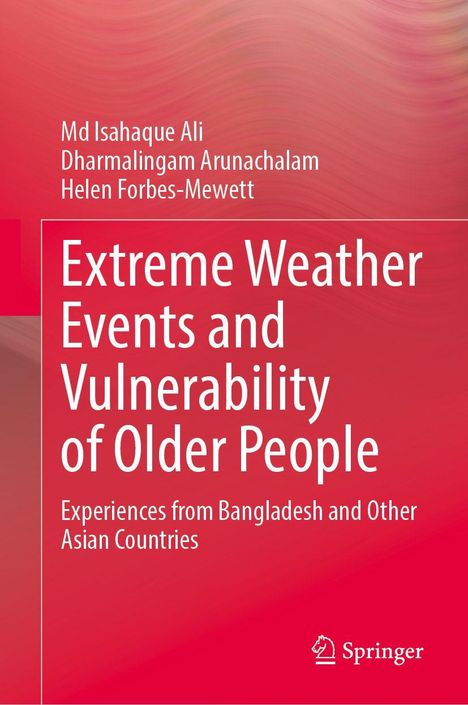Md Isahaque Ali: Extreme Weather Events and Vulnerability of Older People, Gebunden
Extreme Weather Events and Vulnerability of Older People
- Experiences from Bangladesh and Other Asian Countries
(soweit verfügbar beim Lieferanten)
- Verlag:
- Springer, 01/2026
- Einband:
- Gebunden
- Sprache:
- Englisch
- ISBN-13:
- 9783032112552
- Artikelnummer:
- 12494530
- Umfang:
- 168 Seiten
- Gewicht:
- 422 g
- Maße:
- 241 x 160 mm
- Stärke:
- 15 mm
- Erscheinungstermin:
- 3.1.2026
- Hinweis
-
Achtung: Artikel ist nicht in deutscher Sprache!
Klappentext
This book examines the critical intersection of demographic ageing and climate change in Bangladesh, including comparison with other Asia countries. Located in the dynamic delta system of Southeast Asia, Bangladesh is constantly exposed to extreme weather events, the frequency and intensity of which are exacerbated by climate change. Although these disasters affect the entire population, this book argues that older people are at a distinct and disproportionate risk due to their reduced ability to adapt to severe climate-related shocks. Drawing on extensive qualitative field research, the book provides a detailed account of the vulnerability of older adults in a coastal sub-district in Bangladesh. The analysis draws on in-depth interviews with older men and women, whose narratives provide a powerful perspective on life before, during, and after catastrophic weather events. These accounts reveal an ongoing cycle of vulnerability in which cyclones and floods not only destroy material assets such as homes and livelihoods but also cause profound physical and psychological trauma. The resulting disruption of social support networks, loss of income, and forced migration to survive further exacerbate their insecurity. The study identifies several major causes of vulnerability, including the geophysical exposure of the coastal region, the prevalence of non-resilient housing, profound income insecurity, and a high degree of dependence on family support systems. The analysis carefully distinguishes between formal state initiatives, such as the Old Age Allowance, and informal support systems rooted in community and kinship. It shows how formal programmes can strengthen financial stability and ensure access to essentials, while informal networks provide immediate support and practical assistance in the aftermath of a disaster. By synthesising the concepts of exposure, sensitivity, and adaptation, this book offers evidence-based insights into one of the critical challenges of our time. The findings and recommendations are essential for researchers, policy makers and practitioners in the fields of gerontology, disaster management, and climate adaptation, and are an important resource for efforts to protect vulnerable older populations in Bangladesh and other climate-affected regions around the world, in particular in other Asian countries.

